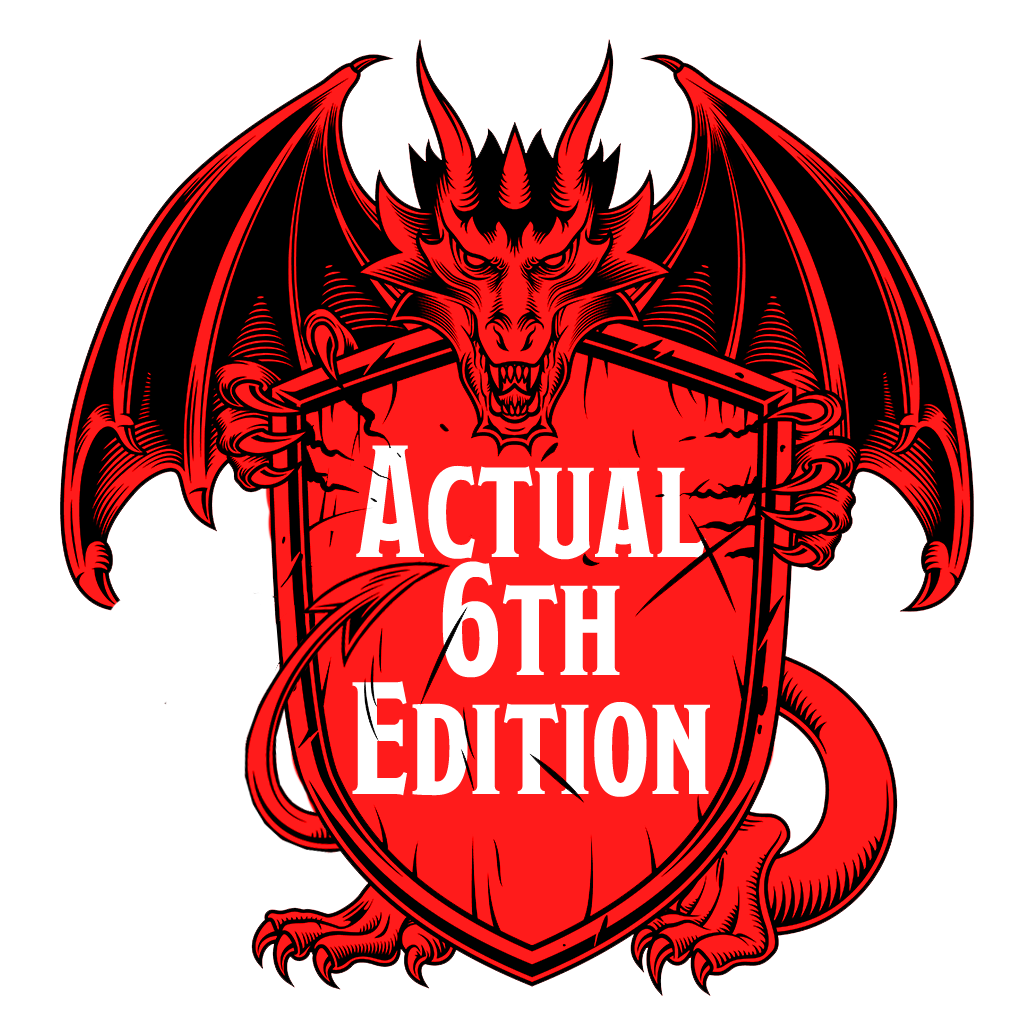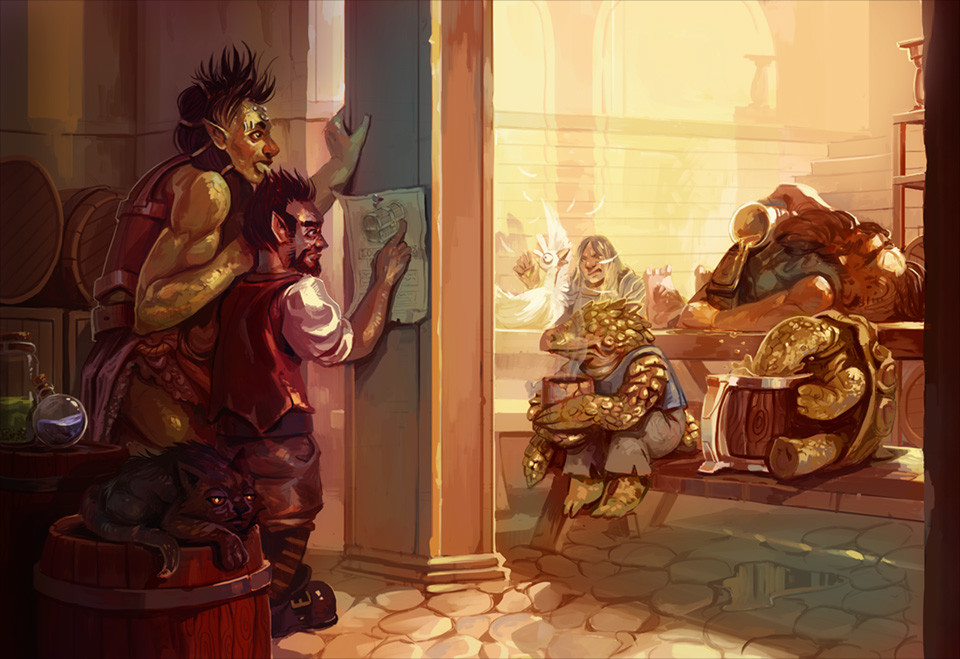



A Robust Downtime
In the vast realm of adventuring, characters often find themselves yearning for more than just the thrill of combat and the acquisition of treasure. They seek personal growth, meaningful achievements, and the realization of their unique visions for character development. This document endeavors to introduce a system that embraces player choice and purpose during downtime, enabling characters to pursue both internal and external goals simultaneously. Within these pages, you will discover a comprehensive overview of this system's mechanics, the diverse avenues of progression it offers, the attainable achievements it unlocks, and the boundless choices that await you as a player.
Declaring Downtime. This section provides guidance on when and how to use downtime in the game.
Downtime Goals When downtime begins, players are presented with a choice for what they would like their character to do, along with how much they would like their character to work, which comes with corresponding bonuses or detriments.
Progressing Goals This section explores the methods for advancing goals during downtime including the unique MAE System which determines your progress based on your characters motivation for the goal, their aptitude for the task and the environment their within.
Calculating Progress. The final section is used to calculate and track progress for simultaneous goals. It additionally offers insights into how a GMs can determine the duration of any unique player-created goals.
Declaring Downtime
Downtime commences when the GM grants permission or initiates a requested downtime period. The GM should always specify the duration of the downtime before it begins. However, you could have events occur during a downtime segment, such as a meeting that the whole party attends that would not disrupt the downtime unless combat was initiated, which in that case would just mean you don't count that day towards the Downtime Duration. It's best to think of downtime like work for the player characters, they will still have around half their day to do any non strenuous activities they need to do like roleplaying or light shopping.
When to Use Downtime
Downtime is a usefull tool for the GM to express a more accurate time scale, RAW it typically takes roughly 33 in game days to go from level 1 to level 20, from paupers to gods in just over a month can feel very dissatisfying. If you do not give your players downtime between arcs, they will of cause begin searching for the next arc because what else would their characters do. It's recommended for a GM to instill downtime between major arcs varying anywhere from a week to a couple months dependent on how much urgency is currently within your story.
Downtime During Travel
Another way to lengthen the time between arcs is to have long stretches of travel, if the continent the players find them selves on, is a similar width to Africa it could take roughly 50 days of travel on horseback to go from coast to coast and during this travel time, your party would have roughly half a day everyday to use for downtime (unless they engage in forced marching, as horses require rest too).
In such cases, adjust the downtime duration by multiplying the number of days by the number of usable hours divided by 16. For example, if they have half the day available, the downtime duration would be half the number of days in total.
As an example, let's consider our party, The Squabs, who will be traveling on horse back for two weeks. Therefore, the downtime duration for them is 7 days.
Downtime Goals
To improve oneself or the environment around you.
As a player, have a think about what your character would like to work on during downtime, are they looking to earn some extra coin or improve their strength for an upcoming battle? Have they got an organization they're looking to infiltrate, or are they looking to craft a magic item to add to their repertoire? It's important to think of goals that your character would be motivated to pursue and most importantly not choose goals that are at the forefront of the story, it's best to not attempt an assassination of the king during downtime, as that might be better suited for a full arc. It can be helpful to think of downtime as what your character does off screen. Have a talk with your GM as well about what might be required for your particular goals, for example, some tasks like creating magic items require large quantities of gold on top of the time it takes to make them.
Downtime goals are split into two categories, Internal and External advancements.
Internal advancements are goals to increase your personal capabilities, this can include a wide array of tasks but some examples include:
- Increasing a stat
- Creating a new spell
- Creating a unique ability
- Crafting a powerful item
- Learning a language
- Gaining a new proficiency
While External advancements are goals outside of yourself, with tasks including but not limited to:
- Working a job
- Building a stronghold
- Working within a guild
- Carousing
- Pit Fighting
- Crime
So once you know which goals your PC would like to pursue, remembering you can have multiple, you now get to make a crucial decision on how determined your character will be during this downtime segment.
Dedication
Depending on the Dedication you pick you will have a number of devotion points that you can split between your internal and external goals as you see fit. It's basically like how do you split your time daily, with your Dedication being how much you decide to work. After you pick one of the dedications from below you will have either 4,8 or 12 dedication points, then you must decide how many dedication points to give to each of your goals. The more dedication points you give to pursuing a goal, the quicker your progress will be.
Devotion
You gain 12 devotion points to split between your downtime goals. However you gain a detriment determined by the GM by forgoing yourself in pursuit of something greater, this detriment should be motivated by the story of why your character is pushing themselves so hard.
Balanced
You gain 8 devotion points to split between your downtime goals.
Relaxation
You gain 4 devotion points to split between downtime goals. This increase in relaxation allows you time to reflect, you gain the ability of your choice from; Inner Strength, Mental Understanding or Philosophical Compassion. These abilities are one-time use and any unused by the next time you enter a downtime segment are lost.
Inner Strength
At the last moment, you tap into something deep in your body, a strength you only now understand you possess and push past your normal capabilities.
As a action, you may replenish one ability that refreshes on a SR completely or an ability which replenishes on a long rest but if it has charges, such as barbarians rage, you instead replenish half of what you would normally. Or instead regain a expended spell slot with a level up to your proficiency bonus.
Mental Understanding
After time to reflect and converse with your own mind, you have grown a deeper understanding of what makes you tick and circuits that connect to create you.
You gain a singular use of legendary resistance.
Philosophical Compassion
With time to reflect on the world and its meaning and the people who inhabit it, you now understand your fellow humanoids to a greater extent.
You gain the ability to insight deep into someone's soul, understanding their true intentions, motivations and desires. Over the course of a minute, you're able to get them to answer questions honestly that they otherwise might not, without any use of magic or trickery.
Let's say Bard John wants to create a unique spell and work at the local thieves guild at the same time. He decides to pick the balanced dedication which gives him 8 devotion points, he then splits his 8 devotion points with 2 going to working at the thieves guild and 6 to working on his new spell.


Internal Goals &
The MAE System
For each internal goal you pursue during downtime you will make a MAE system check, MAE stands for Motivation, Aptitude, and Environment. When working towards an internal goal, you will roll three dice based on these factors, ranging from a D4 to a D12. Simultaneously rolling these three dice, you will take the median/middle result as your outcome.
Motivation
First, the GM will ask for your characters motivation for pursuing this task and will award a die between a D4 and D12 dependent on how strong your motivation is. The table belows gives some insight on when to award which die, remember to think how this downtime goal relates to the characters back story or current desires.
| Die size | Motivation |
|---|---|
| D4 | Only a want, not a need |
| D6 | A deep desire |
| D8 | A need but not a purpose |
| D10 | Your lifes purpose |
| D12 | Life or death |
Aptitude
Next, the GM will ask for your characters aptitude for this particular goal and will award a die between a D4 and D12 dependent on your characters ability to pursue this goal. Determining a characters aptitude can both be effected by their back story and their character mechanics. A artificer has higher aptitude for making magic items than most but a fighter who spent his youth working under a evil artificer where he was forced to make magic items, would also have appropriate skill for this task.
| Die size | Aptitude |
|---|---|
| D4 | No prior work like this task |
| D6 | Experience working towards this task or proficiency in a relevant skill |
| D8 | Previous completion of this task or great experience in a relevant field |
| D10 | This goal is fundamentally aligned with their character or expertise in a relevant skill |
| D12 | This goal has been their life's mission |
Environment
Lastly, the GM will ask where your character is pursuing your downtime goal and with whom, and then will award a die between a D4 and D12 dependent on how ample the environment is. This stage will have the most back and forth between the GM and player, as it is the easiest to change in the moment, the players might ask if bringing in a friend would help their goal or how changing to a different location might effect the die. As a GM, it is best to award creativity, if the player can justify to you how a change to their environment improves it significantly, it would be wise to increase their die size to award them.
| Die size | Environment |
|---|---|
| D4 | Not suitable location |
| D6 | Making do while having some necessary tools or helping hands |
| D8 | A work area suited for the task or accompanied by a proficient helper |
| D10 | A work area specially designed for this task or accompanied by a expert |
| D12 | Both a specially designed area and accompanied by a expert |
Calculating Progress
Silence you mathematical wretch! What do these ridiculous numbers all mean then! Sorry, we’re almost done! This is the Formula of Progress, this final number determines how much progress you make towards your goals, called Progress Points.
The Formula
Formula of Progress
An Example
Let's illustrate this with an example: Bard John, who aspires to create a new spell called "The Raging Sun Inferno!" To begin, Bard John discusses his plan with the GM, outlining the in-game requirements and necessary tools. Once established, the MAE system comes into play.
The GM initiates the process by asking about John's motivation behind creating this spell and assigns a dice based on his answer. John explains that he wants to create the spell because it's cool and he wants to blow things up. While nothing is wrong with that, it may not be the most profound character motivation, so the GM decides on a D4 for motivation.
Next comes aptitude. John argues that, as a lore bard who worked in a wizard's tower for ten years, he should possess sufficient skill in spell creation. The GM agrees and assigns a D8 for aptitude.
Finally, the environment is considered where and with whom John plans to work on the spell. John reveals his intention to use his planar shift ability to teleport to the Nine Hells and create the spell there. The GM finds this idea wonderfully creative and deems it a perfect environment for the task, awarding a D10.
Now, Bard John has a D4 in motivation, D8 in aptitude, and a D10 in environment. He rolls all three dice, resulting in a 3 from the D4, 2 from the D8, and 9 from the D10. Taking the middle result, which is 3, John's outcome is determined.
Although he rolled a 2 on his D8 and faced some bad luck, it highlights the central aspect of the MAE system, each factor is significant. Since the median of the three dice determines progress, having even one unfavourable dice can greatly impact the pace of advancement. Therefore, it is crucial to aim for a strong motivation, aptitude, and environment for your goal. Remember, regardless of the outcome, progress is always being made; the MAE system simply determines the speed at which you reach your objective.
So for Bard John, he would get: 3(from rolling a 3 in the MAE system) x 14/100 (14 days of downtime) x 6 (He split his 8 devotion points from his balanced dedication with 6 for internal and 2 for external) for a total of 2.5 progress points towards creating his new spell.
How Long Will it Take?
Obviously, I can’t account for everything someone might request, especially when it comes to unique abilities or magic items but below is a table for the most common requests.
For a rough basis for how long something will take - with 1 workweek with an average roll of 4.5 on MAE and 6 devotion points will equal roughly 2 Progress Points. So a goal with 20 progress points required will take roughly 10 weeks to complete if they are working on other goals at the same time or around 8 weeks if it is their only goal.

















Table of Internal Goals
| Internal Goal | Type | Progress Points Required | Additional Requirements |
|---|---|---|---|
| Crafting Magic Items | Common | 2.5 | +50g |
| Uncommon | 5 | +200g | |
| Rare | 25 | +2000g | |
| Very Rare | 62.5 | +20,000g | |
| Legendary | 125 | +100,000g | |
| Crafting Spell Scrolls | Cantrip | 0.35 | +15g |
| 1st | 0.35 | +25g | |
| 2nd | 1.05 | +250g | |
| 3rd | 2.5 | +500g | |
| 4th | 5 | +2500g | |
| 5th | 10 | +5000g | |
| 6th | 20 | +15,000g | |
| 7th | 40 | +25,000g | |
| 8th | 80 | +50,000g | |
| 9th | 120 | +250,000g | |
| Increase a ability score by 1 | 50 | ||
| Gain a feat | 100 (Or 50 for half feats foregoing the ASI) | ||
| Learn a new spell | 5 x the spell level | - It must be from a spell list you have access to and of a spell level you able to cast when you finish this downtime. *This is separate from the Wizards scribe spell ability | |
| Create a unique spell | 10 x the spell level | ||
| Create a unique ability | 0-∞ | The GM should give you a rough estimate of how long the ability you seek would take - Basing it off similar spells or items gives a good estimate. Want to cast shield once a day? Then it could be 5 PP to learn the spell and 14PP to cast the spell once pr LR therefore the cost would be 19 PP | |
| Gaining a proficiency from language, tool or simple weapon | 15 | ||
| Gaining a skill proficiency | 20 | ||
| Gaining expertise with a skill or tool proficiency which you already have | 30 |
External Goals
External goals in this system utilise those outlined in Xanathar's Guide to Everything, emphasising skill challenges and role-playing opportunities. To begin, have a conversation with the GM about what you aim to achieve during this downtime. Discuss the requirements, difficulty level, and whether other PCs will be involved.
One important change while incorporating Xanathar's rules into the system, is to multiply the result you obtain by the Time & Devotion Multiplier (TDM) and round up if necessary. For example, if someone earns 50gp from a week of pit fighting and their TDM is 0.5, their reward will be reduced to 25gp. This decrease accounts for the system's allowance of PCs focusing on multiple tasks simultaneously for more engaging downtime. However, if a PC chooses to concentrate on a single task, the result should be roughly equivalent to what they would achieve under normal circumstances.
Time & Devotion Multiplier (TDM)
Time & Devotion Multiplier (TDM)
Unique Ability Calculations
Now there is a infinite list of requests your players could present, but do not threat! The majority of unique requests for downtime will have some similar basis to go off, whenever a player asks for something outside of the list below; first look for any magic items, feats or spells that archive the same or similar effects. Here are some example to help with this:
Example 1: Learning a cantrip
Your player requests to learn a cantrip outside of their spell list during downtime. Well there is the feat magic initiate which gives two cantrips and one 1st level spell. So if they just want one cantrip then you know its going to be less than the PP required for a full feat (100), we know a locked spell slot is worth 14pp so can take that away. 86 PP for two cantrips and a 1st level spell from another spell list, I would then take the collective spell points of two cantrips and a 1st level and split it based on that. 86 PP divided by 4 spell points = 21.5 PP per spell point to learn a spell from another class list. So to learn a cantrip, you could say it would cost 21.5 PP to complete.
Its important to remind at this stage, that the GM always has veto power. If you believe as a GM something a player is going for is either to powerful or will obstruct the fun of the game or other players, then you have every right to say no. For example of when to think of this is if a player wants to obtain eldritch blast, because it's so good, but another player is playing a warlock its probably best to not allow it as it would take from the class identity of another player, but if none of your players are playing warlock then it might okay to allow it. The choice is always yours GM's!
Example 2: Permanent Truesight
Let's say that your player wants the unique ability of Permanent Truesight, how would you go about calculating this? First look for any examples of this ability in magic items or spells and we find the 6th level spell true seeing that lasts 1 hour.
Now, it's best if your player is savvy to talk openly about your thought process with them, so they can adjust with your thinking. So telling them they could have true sight a limited number of times a day a lot easier might convince them they don’t need it permanently and will help them understand a huge investment if they would like it permanently.
But if they really want permanent truesight, let's calculate. So just learning the spell would take 30 PP (see table) and According to the table of spell slots, a locked 6th level spell slot is worth 63 PP but that's still only for 1 hour. Now you could multiply it by 16 but that's quite harsh, they won’t actually be actively using the ability all day so I'll times by 3. Therefore to unlock permanent truesight the total would be 189+30 = 219 PP
Table of Spell Slots
Additionally I have calculated how much limited uses of spells is worth in Progress Points for easier calculating based off this:
Fey Touched is a half feat giving a locked 1st & 2nd level spell slot and a two learnt spells. So Fey Touched is worth 50 PP as a half feat. But we can minus the two new spells learnt (5 & 10 respectfully). Therefore the two locked spell slots are worth 35 PP - therefore a locked spell slot is worth 14 PP (5X=35, using spell points). I would recommend not giving Locked spell slots out too frequently and for most games, never for the spell slots of 5 and above. This is mostly for calculations.
| Locked Spell Slot Level Per LR | Cost in PP | Spell Points |
|---|---|---|
| 1 | 14 | 2 |
| 2 | 21 | 3 |
| 3 | 35 | 5 |
| 4 | 42 | 6 |
| 5 | 49 | 7 |
| 6 | 63 | 9 |
| 7 | 70 | 10 |
| 8 | 77 | 11 |
| 9 | 91 | 13 |
Credits
Thank you for reading my homebrew, I hope you enjoyed and might decide to use this in your games. I am always open to feedback and love hearing how you use my stuff, the best place to message me is on the TheBritishDM's Discord or on reddit via /u/TheBritishDM
Actual 6th Edition
With OneDND set on being closer to a 5.1 than a real 6th edition, I like many within the community are frustrated by the lack of experimentation from the designers and their seeming unwillingness to fix any of the real problems the game faces. I am but a humble long time homebrewer but I believe a person outside that of a mega corporation is what is needed to create a better 5e.
What makes this project different?
While they're are many great 5e based systems out there, there is none that seem to do what many people want, make 5e better. Not a game with some 5e elements, not a mix between 5e and another system, not a game that changes the fundamentals that made 5e so great. A game that stays in line with the great design philosophies of 5e while fixing the problems that have come apparent during its ten year run, thats what a good chunk of the community have shown me they want and I hope with my passion I can complete this task for my game and everyones.
Design Philosophy
First: Rules stay light in roleplay to not inhibit the expression of story and remain heavy in combat but never to a hindering amount.
Second: The GM is there to have fun, the rules they utilize should never hinder this, the GM should have the ability to adapt to situations knowing the rules are their to support them.
Third: This system shall remain playable for the less savvy players and those who search for depth. Whether possible the player should have the option of complexity or simplicity.
Community Engagement
First and foremost, this project will tackle the problems that the community as a whole agree on. Throughout the project, I will release updates and supplements to be playtested by those who would intend to use them and then use feedback provided to improve the system as a whole. There should be no surprises when this project finishes, those who engage shall already know what to expect. I hope you all enjoy and that I'm not alone in my ambitions for A6E.
Helping
If you would like to add any 5e problems or missing systems to the list on the right or talk about your thoughts on creating A6E, the best place to talk to me is in the discord:
TheBritishDM's Discord
Problems to Fix
Problem Status Expertise WIP Fighting Styles Pending Adventuring Day Pending Encounter Design/CR Pending SR/LR Disparity WIP Martial/Caster Disparity WIP High level Problem spells WIP Monster Complexity Pending Mounted Combat Pending Tools Pending Darkvision Pending Bad DMG Pending Tiers of play Pending Class Design WIP* Backgrounds WIP
Missing Systems to Add
System Status Downtime WIP GM Game Choice Pending GM running the game advice Pending Exploration Rules Pending Mass Combat Rules Pending Tools/Spells for mystery based arcs Pending

Adaptive Downtime
A robust downtime system allowing players to progress multiple goals at once, with tools for the GM to track and balance this progress.
Version 0.3 Created by /u/TheBritishDM
Join on the discord at TheBritishDM's Discord
Artist Credits:
Page 1&2 - Orc and Gnome - The TEMP Guild Tavern
Page 4: AllrichArt - Forge
Page 5: Sapphhyra - Ghesh's Guide to Making Things
Page 9: Greg Rutkowski - Rise of the Overlords
Additional A6E content and other TheBritishDM Homebrew content, including system redesigns can be found for free on GM Binder.
This work includes material taken from the System Reference Document 5.1 (“SRD 5.1”) by Wizards of the Coast LLC and available at https://dnd.wizards.com/resources/systems-reference-document. The SRD 5.1 is licensed under the Creative Commons Attribution 4.0 International License available at https://creativecommons.org/licenses/by/4.0/legalcode.